
True Notebooks
A Writer's Year at Juvenile Hall
فرمت کتاب
audiobook
تاریخ انتشار
2003
Lexile Score
780
Reading Level
3-4
نویسنده
Paul Boehmerشابک
9780736698856
کتاب های مرتبط
- اطلاعات
- نقد و بررسی
- دیدگاه کاربران
نقد و بررسی

The true story of the author's experiences leading writing workshops for incarcerated juvenile offenders seems highly embellished. The young murderers and gang-bangers are surprisingly eloquent and sympathetic, though their deeds are appalling. The fascinating, albeit not altogether credible, adventure is given a sound of na•veté by Paul Boehmer. For the first third or so of the book, he seems callow and detached. However, the characters and situations eventually ignite him into a spirited reading. Y.R. (c) AudioFile 2004, Portland, Maine

Starred review from June 16, 2003
Salzman (Lying Awake; Iron & Silk) volunteered to teach creative writing at Central Juvenile Hall, a Los Angeles County detention facility for "high-risk" juvenile offenders. Most of these under-18 youths had been charged with murder or other serious crimes, and after trial and sentencing many would end up in a penitentiary, some for life. Sister Janet Harris, of the Inside Out Writers program, convinced Salzman that in spite of his reservations—about teaching writing, about being a white liberal offering "art" to darker-skinned ghetto boys—these children needed to be encouraged to express themselves in writing instead of acting out, needed to feel they mattered to someone. So Salzman started coming twice a week to meet with three boys, although their number quickly grew. He tried to structure each session with a half hour for writing followed by each boy reading his work aloud, although after a lockdown or a class member's trial, he had to loosen the routine. While their writing themes are somewhat predictable—their anger and violent impulses, their relationships with parents and gangs, plus a tedious dose of "pussy, bullets, and beer"—the discussions these essays provoked were personal and often explosive. As productive as these classes were, everyone was always aware of the painful truth that students would soon be shipped out to more brutal facilities. Salzman doesn't dwell on that, concluding that "a little good has got to be better than no good at all." Indeed, his account's power comes from keeping its focus squarely on these boys, their writing and their coming-to-terms with the mess their lives had become. (Sept. 23)Forecast:The success of Adrian Nicole LeBlanc's recent
Random Family: Love, Drugs, Trouble, and Coming of Age in the Bronx and, to a lesser extent, Wally Lamb's
Couldn't Keep It to Myself: Testimonies from Our Imprisoned Sisters, along with media publicity, could mean strong sales for Salzman. Knopf plans a 75,000 first printing.

Starred review from September 1, 2004
True Notebooks describes Salzman's experiences as a writing instructor in Los Angeles's Central Juvenile Hall. His involvement in the writing program came at the suggestion of a friend and fellow writer who thought that Salzman's participation might pull him out of a slump in the writing of his second novel. Initially skeptical of his ability to connect with the inmates, Salzman eventually gained their trust and respect. He encouraged his students to write about anything except their pending trials. Without glossing over the capacity for violence in his students, the author focuses on the creativity and vulnerability revealed in their writing. Paul Boehmer provides a compelling narration, despite the challenge of capturing the rhythm and ferocity of some of the inmates' language. Highly recommended for general collections. Philip Bader, Pasadena, CA
Copyright 2004 Library Journal, LLC Used with permission.

























دیدگاه کاربران